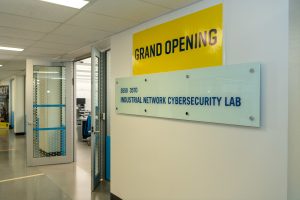
With cybercrime set to cost the world $10.5 trillion by 2025, businesses need to view cybersecurity as an integral part of their digital transformation strategies. The food we eat and water we drink, the petroleum products that fuel our cars and heat our homes, and the electricity that powers our modern society all rely on industrial control systems and these industrial networks are susceptible to a range of cyberattacks.
In response to the growing need for skilled professionals to protect industrial network from cybersecurity threats, BCIT officially opens door to its Industrial Network Cybersecurity Lab (INC Lab) for training the next generation of network security professionals.
The fully interactive INC Lab is the first of its kind in Canada and is a state-of-the-art facility that is specifically designed to train students in the Industrial Network Cybersecurity (INC) program using game-based learning. By working with each other, students effectively learn and are equipped with skills to defend against cyberthreats to industrial, manufacturing, and critical infrastructure organizations.
A lab designed using game-based learning
The BCIT Industrial Network Cybersecurity program, launched in 2019, was forged from a collaboration between the School of Energy and the School of Computing and Academic Studies.
This two-year diploma program is the brainchild of Roger Gale, Program Head, and David Leversage, Program Instructor, both of whom have taught at BCIT for over 20 years. Both Roger and David have been heavily involved with the INC Lab development since its inception.
Roger explains that a cybersecurity skills gap exists within the plant operations side of most industrial organizations, which needs to be addressed.
“We have a situation where IT people know about security, but they don’t necessarily know about automation,” says Roger. “David and I proposed to inform people about both, so we built the Industrial Network Cybersecurity program and Lab based on that.”
He says although BCIT already has a number of automation labs in which to train students, they are not equipped to provide critical infrastructure training.
The INC Lab was developed with student working groups in mind, which happens to be one of BCIT’s core strengths.
“We designed the lab with the idea that groups work best for teaching,” says Roger. “You need to have students working with each other in order to learn effectively, not unlike many other BCIT programs with cohort-based models.”
Graduates from the program have been employed in positions that support the networking and network security of operational technology and industrial networks. Employment opportunities span across industries from engineering consulting firms to food-and-beverage processing plants, and beyond.
Have you subscribed? Sign-up to receive the latest news on BCIT.
Innovative technology from industry provides students with practical experience
BCIT prides itself on its access to innovative technology, and the INC Lab is certainly no exception. The lab utilizes cutting-edge equipment sourced from a variety of vendors, including simulated factory models from a German tech company called Fischertechnik.
“The models, which sit on top of the student workstations, simulate tire manufacturing plants,” says Roger. “Each student is able to control an individual section of the plant, with all sections having to work together to control the plant as a whole.”
Roger says BCIT’s industry partners have been very receptive to the development of the INC Lab, and highly supportive of BCIT’s overall goal of narrowing the skills gap in industrial cybersecurity.
“We had a sizeable equipment donation from Cisco utilizing their Country Digital Acceleration funding and CBVL Robotics in Coquitlam provided the Operations Desk. Rockwell Automation gave us a significant discount on the remaining operational technology. The very strong support from industry for the lab, is a testament to BCIT’s vast industry network,” says Roger.
BCIT also consulted with several organizations across Canada, including Canadian Nuclear Laboratories, which had a substantial amount of input into the design of the INC lab.
Filling the skills gap for industrial cybersecurity professionals
Cybercriminals and hacker groups now operate on a global scale, and as they acquire more resources and become more interconnected, the threat posed to industrial operations will only intensify.
Rogers stresses the importance of bolstering industrial networks in order to counter potential cyber attacks, which are being increasingly complex.
“When we’re defending against hacker groups in today’s environment, we need to be implementing a much higher level of integration across industries and networks, and think very seriously about how we defend our systems,” says Roger.
He says the INC Lab is designed to do just that, and lauds all BCIT INC program faculty and staff for developing this incredibly innovative resource, but also reminds us that this is an ongoing effort.
“This is the direction I think BCIT will continue to follow into the future,” says Roger. “Focusing on cybersecurity as a mindset, and looking at all types of attacks – people, processes, and technology – and really building out that framework.”
He looks forward to expanding the INC Lab over the coming years and incorporating new and different technologies as they arise.
Learn more about the BCIT Industrial Network Cybersecurity program
